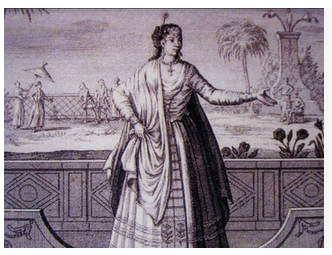Shah Alam, Prince
This is a collection of articles archived for the excellence of their content. |
Juliana Dias Da Costa
Gauree Malkarnekar|A love affair that saved Portuguese from Mughals|Jul 23, 2017: Times of India
Highlights
Portuguese woman, Dona Juliana Dias Da Costa, held sway over Aurangazeb’s son, Shah Alam.
She not only helped safeguard Christians in the then Mughal-ruled India but also assisted in spreading on the faith in Portuguese India. A book, Juliana Nama, brings to light the role of this lady-in-waiting to Shah Alam.
It was an unusual love affair between a woman of Portuguese origin and a Mughal prince. And such was the intensity of their love that the Portuguese woman, Dona Juliana Dias Da Costa, held sway over Aurangazeb's son, Shah Alam, and she not only helped safeguard Christians in the then Mughal-ruled India but also assisted in spreading on the faith in Portuguese India.
Juliana Nama, a book by former director of National Museum in Delhi Madhukar Tewari and archivist Raghuraj Singh Chauhan, has for the first time pieced together information from five different languages, including Persian and Portuguese, to bring to light the role of this lady-in-waiting to Shah Alam.
Tewari and Chauhan stumbled upon the diplomatic role of this Portuguese Catholic lady in the eighties and spent four decades to write arguably the most comprehensive documentation of Mughal, Portuguese, British, Dutch and French interaction in India. They narrate the Portuguese tactics for survival with the Mughals through the story of the love affair between Juliana and Shah.
From the time they established a settlement in Hugli with the favour of Mughal emperor Akbar, the Portuguese were comfortably living there till they managed to annoy his son with their transgressions, leading to him sacking the settlement in 1632. As a result, "4,000 Christians were taken captives in lamentable conditions" to Agra. Juliana's parents, according to the book, are said to have been among these prisoners and so Juliana was born in Agra around 1645, by which time her mother was attached to one of the ladies in Shah Jahan's harem.
Following her parents' death, Juliana was brought up by Father Antonio de Magalhanes in Delhi.
And this upbringing under the patronage of Jesuit Fathers, including years spent in Goa, according to the authors, made her proficient in skills that would make her a diplomat par excellence. "Skills like her proficiency in languages, international exposure to the happenings around the world, including the knowledge of international trade and merchandise, knowledge of medicine and surgery as the Fathers had in their company Portuguese doctors from Goa, and above all the royal manners and customs," helped her gain experience, write Tewari and Chauhan.
Though Juliana was married, she was widowed young, paving the way for her entry to the Mughal court through Father Magalhanes in 1681-82.
"Aurangzeb entrusted the education of Prince Muazzam (later Shah Alam), his second son, to Juliana. She was 17 and his youngest tutor. Muazzam was 18 and was filled with remorse for the merciless imprisonment of his grandfather Shah Jahan," says Tewari, and the seeds of a lifelong love affair were sowed.
The book provides Portuguese letters written by the viceroy in Goa to the King in Portugal telling him of the favour Juliana holds in the Mughal courts.
Juliana, states the book, moved wherever Shah Alam was posted by Aurangzeb, including to Goa to put an end to the threat posed by the Maratha leader, Sambhaji. When later Shah Alam was suspected of treason by Aurganzeb and jailed, Juliana is believed to have risked her life to make his seven years in prison comfortable by smuggling items of luxury.
This loyalty bore fruit when Shah Alam finally ascended the throne after his father Aurangzeb's death.
The book elaborates the role of Juliana in helping Shah Alam win the battle to the throne against his own brothers. Juliana is said to have got Shah Alam to deploy Portuguese gunners in his artillery, which proved a successful move.
